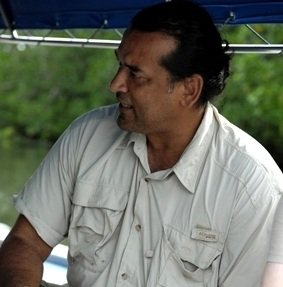
The Arden Naturalist
Irshad is brother to Ishtiaq, country’s most celebrated huddler in the 70s. His early years were spent in Seremban. Then he moved to Lumpur where he was miserable said. “I was working in a bank and I couldn’t hack the 9 to 5 thing. So I found my way here 10 years ago. “I am lucky today my job is my hobby.” He said when we met during the Langkawi Scientific and Heritage Expedition 2003 lost month. More than 150 scientists from several local universities and their postgraduate students participated in the expedition sponsored by the Langkawi Development Authority, the Forestry Department, the Malaysia Nature Society and the Mutiara Burau Bay Beach Resort in Langkawi.
Irshad was among a handful of non scientists who attended lectures, nightly at the Burau Bay Beach Resort during the 10 days expedition to find out what the scientists had gathered or discovered during their field trips around the island. On the days when he wasn’t trekking with tourists he led the scientists around the smaller Island, singling out the birds and so rarely seen in other part of the country. He also provided us a long, list of conservation woes faced by Langkawi. “I have a dream for this island,” he said when we stopped for lunch on Pulau Langgun on the north-western side. “I would like the entire northern part to be turned into a nature Park. This will bring in rangers so that plants like the cycads won’t get stolen. Right now fines of up to RM. 50.000 are just not good enough because there is no enforcement”.
Irshad also hope that more resort will hire a naturalist like him. He is more than willing to help train them. He says tour guides who have little knowledge tend to employ gimmicks which can cause tremendous harm to the environment. For instance, feeding eagles with chicken entrails can disrupt the life cycle of wild birds which are not, used to the high levels of hormones in battery chicken. “If the eagles feed on this often who knows how their eggs or young will he affected”? He is also constantly reminding boatmen to slow down as they navigate the mangrove swamps along the lower reaches of Kilim River. “When they speed, the waves created by the movement of the boats will erode the river bank faster these are small but crucial things which many of our people may not know,” he says.
In his spare times, he designs cards for sale at The Datai. The styled pictures of animals common to Langkawi are a hit with foreign tourist and all proceeds go to charity. Irshad also hopes to teach the locals precision farming. He demonstrated how on a small patch of jungle orchids and mushrooms can be grown without disturbing the ecology of the area. “This is the only way to do it,” he says emphatically. “If our livelihood is connected to the jungle, we must protect and preserve it.”




